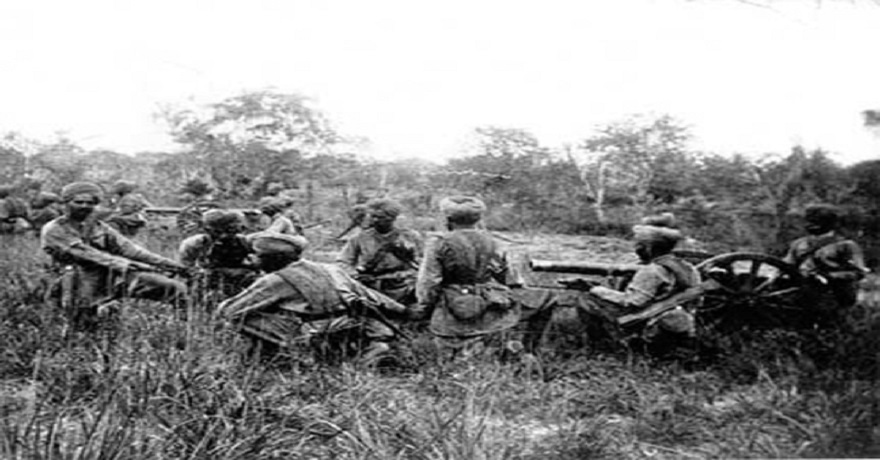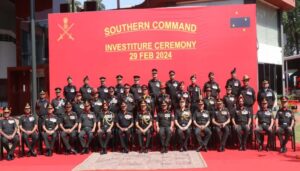Pakistani Army Officer’s Book ‘Raiders in Kashmir: Story of the Kashmir War’ Spills The Beans

Subroto Roy
New Delhi, 21st October 2021: Flashback to October 29, 1947 – three months after the disastrous partition of India. The book is a one-sided tale of the exploits of Pakistan supported tribesmen, militia from POK, and locals who were opposed to the Maharajah of Kashmir written by none other than a retired Maj. General who not only was in the thick of things up front, but also was consulted often by Mohammad Ali Jinnah – the founder of Pakistan and first Governor General of the dominion.
Their unifying factor of Pakistan against India was Islam, according to the author himself. So, what the borders of India along J & K saw post-partition, starting from October 29, 1947 to December 31, 1948 was a one-sided hate affair by way of Pakistan’s aggression on India. In his zeal to defend his Religion, the author exposes the systemic Jehadi tendency of Pakistani-s also evident in his graphic descriptions of its aggression on India following partition in 1947.
India had to defend its legitimate territories, but her only fault according to the author, lay in a continual effort in trying to win over the majority population of J & K who hated to be under the Maharajah and would go on to participate he terms as ‘uprising’ which Pakistan would not only catalyse, but also participate.
The author then records his personal tragedy of being arrested by the Pakistan government which was almost coherent with the assassination of Jinnah. He also, perhaps inadvertently gives the reasons for the complete takeover of Pakistan by its army undermining all democratic values.
Yet, it surprises one, why Pakistan is even today a non-member ally of NATO. Perhaps ideals are only show pieces to hide the cobwebs of geo-politics in the cupboard full of skeletons of the common man. India then remained aloof from the then powers at least overtly.
Pakistan – Then, Now, and Tomorrow
The author within his ‘war’ narrative gives us a picture of what Pakistan’s future is going to be. After the Indo-Pak Ceasefire on December 31, 1948, he quotes Pakistani Brig. (Later Lt. Gen.) Habibullah saying, “Pakistan was like a beautiful woman who should sell herself to the highest bidder”. This betrays three things. First is the sick mindset of the Brig. Habibullah with respect to women (pun intended) women. Second is his accurate assessment of what his country was reduced to diplomatically by India. “And ultimately, our relationship with the U.S. was not far removed from some such description,” the author confesses.
Pakistan’s new-found power due to the USA and its impoverishment were closely linked. It is today, so indebted to the world that it has to give the Prime minister’s residence on lease to China. It was lately foolhardy enough to engineer Haqqani hegemony over the unrecognised government of Taliban.
Thirdly, with such bankruptcy of money and of intellect, Pakistan’s future as a sovereign entity is doomed. Pakistan will soon be history, if this trend which started after it inaugurated its Jihad against India, continues.
Beans Spilled
The author himself reveals definitive elements of Jehad although the book’s title has the word ‘War’. He stops short of actually telling the world that Pakistan’s is an ongoing and declared Jehad. The first element that betrays Pakistan’s true colours is its un-numbered left page. Actually and ironically, the retired Pakistani Major General’s book begins with a Quranic verse which spills the beans:
“And call not dead these who are killed in the way of God. Nay, they are living, only ye perceive not.”
But lo and behold! He actually waters down the Surah 2, al-Baqarah verse 154. This is a clear sign of intellectual dishonesty of a bigot in the face of failure. Read the following real Surah:
“And do not say that whoso is killed in the path of Allah his dead. No! Indeed they are alive but you do not know how.”
The second element is that the author’s religion is a unifying factor in Pakistan and thus formidable in conflict, by his own submission.
The third element exposing the Jehad narrative is the reason for tribesmen to join the ‘war’ given by the author himself. He writes (sic), ‘What had brought the tribesmen into Kashmir? It was the deep concern they had felt and shared with all Muslims about the future of the State.”
So the three above elements clearly expose the fact that Pakistan’s is neither a war nor is it terrorism. It is Jihad against India.
Dr. Ajay Chungroo, the chairman of Panun Kashmir also likes to call this Pakistani aggression ‘Jehad’ rather than ‘terror’ or ‘war’.
There is no doubt about this because even today we see evidence of the same single-minded Ghazwa-e-Hind unfolding.
As this review was being written (Monday;12.10.21) the news of five army personnel being martyred during a combing operation in Poonch’s Dera Ki Gali shook India. But in the preceding few days, several Kashmiri Pandits and BJP workers were selectively killed, clearly signalling Pakistan’s obsession with Jehad.
Pak Betrayal of Tribesmen
Pakistan not only betrayed the author of this book – a sincere Jehadi by twice putting him behind bars, but the tribesmen were also badly let down by the wannabe Pakistani military establishment during the 1947 misadventure.
The author glorifies the tribesmen from between North West Frontier Province and the Durand Line, as ‘important factor in the strength of Pakistan’ especially directed at that time for the ‘liberation’ of Kashmir from the Maharajah. Apart from them, Tori-s from Kurram, Dir-s, Zadran-s, and even Tajiks from Afghanistan, and Gizali-s joined the ‘liberation movement’ along with a large number of locals south of Bagh.
But he also terms as ‘unfortunate’ its habit of betrayal exemplified in the use-and-throw policy towards its own tribesmen let loose against ‘kafir-s’. He says “In connection with ammunition, the tribesmen came in for heavy accusations” that they “took most of their ammunition back out of Kashmir”. “On 20th April, the Pakistan Army Commander-in-Chief General Gracey reported to the Pakistan government,” writes Khan inter alia, “An easy victory of Indian Army….is almost certain to arouse the anger of tribesmen against Pakistan for its failure to render them more direct assistance…”
He uses the word ‘use’ in the context of his tribesmen several times in his book although the author himself was a ‘Pathan’. He describes how in the midst of a campaign to take Srinagar, the tribesmen vanished from the scene apprehending open war with Indian Army columns supported by Indian Air Force. As such he makes it clear how they can easily be defeated in flat terrains, but their smaller groups can harass scattered army units.
Given this first person account, one wonders what would be the plight of the Haqqani-s and Talib-s whom the current Pakistani establishment has used.
History was to repeat itself for the third time when Pakistan now uses the Taliban to potentiate a furthering of its dream of Ghazwa-e-Hind. The book is replete with evidence of Pakistan’s pro-active role in killings of innocent people in Kashmir and Indian soldiers posted there.
The officer himself reveals how the tribesmen fled from a battlefield when they realised that the Pakistani Army had not built any support system to be able to take on the Indian formidable army brigades given aerial support by Indian Air Force. The tribesmen were not a paid force and made money by selling Indian arms and ammunition captured in battle. They also changed their soiled and torn traditional dresses to put on Indian Army uniforms.
After retreating from Indian soil, they realised that there was no arrangement for them of food and shelter on the Pakistani side.
It was not an irony during Pakistan’s proxy war against erstwhile Soviet Union using the Taliban and it is not an irony now when the Haqqani-s and Talib-s are used to destabilise South Asia. Pakistan’s betrayal of the tribals is a pattern. It is only a matter of time when the Haqqani-s will start their Pakistani agenda against the Taliban leading to a repeat of the same history.
Ghazni, Babur, Timur, and all other killers of innocent people are the role models brazenly eulogised in the book.
Book: ‘Raiders in Kashmir: Story of the Kashmir War’
Author: Maj. Gen. Akbar Khan (Retd. Pakistan Army), DSO
Publisher: PAk Publishers (Karachi)
Year: 1970
Pages : 172








